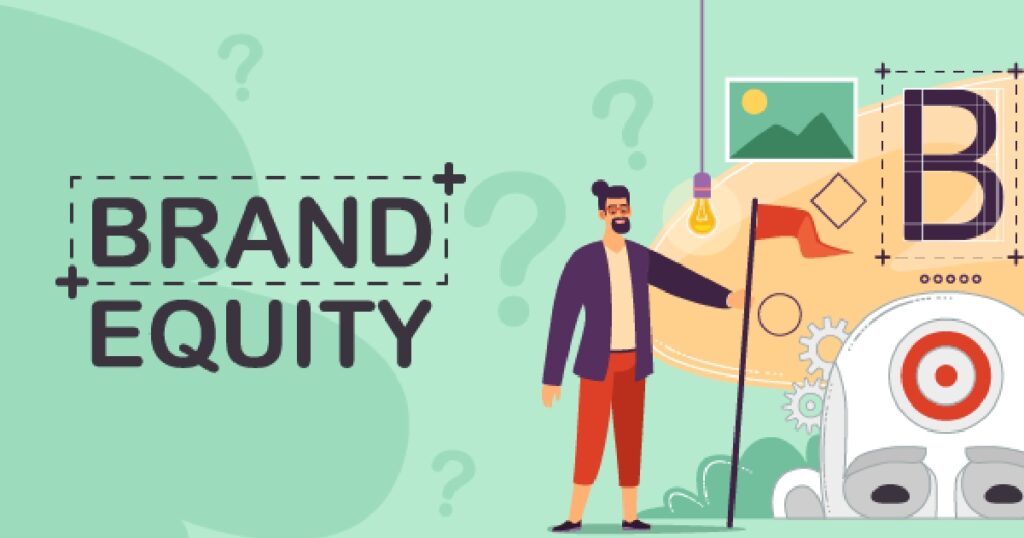Every successful business strives to establish a powerful presence in the market, capturing the attention and loyalty of consumers. To achieve this, companies invest in two crucial aspects: brand awareness and brand equity. While these terms may sound similar, they represent distinct elements that contribute to a brand’s success. In this article, we will explore the difference between them, highlighting their unique features, significance, and the impact they have on a company’s growth.
Brand Awareness: Making Your Presence Known

It is the degree to which consumers recognize and recall a particular brand. It measures the familiarity and recognition of a brand among its target audience. Developing it is like introducing yourself to someone you’ve never met before – it’s about making a memorable first impression. By creating strong brand awareness, businesses strive to become a familiar name in the market and the go-to choice for consumers when they have a specific need.
Why is Brand Awareness Important?
It plays a vital role in establishing a brand’s reputation and credibility. When consumers are aware of a brand, they are more likely to consider it as an option when making purchasing decisions. It provides a foundation for brand loyalty and helps businesses differentiate themselves from competitors. Additionally, higher brand awareness can lead to increased market share and customer acquisition.
Strategies for Building it
- Content Marketing: Creating valuable and engaging content that showcases the brand’s expertise and solves consumer problems.
- Social Media Presence: Utilizing various social media platforms to connect with the target audience and share brand messages.
- Influencer Marketing: Collaborating with influencers or thought leaders in the industry to expand brand reach and credibility.
- Public Relations: Securing media coverage and press releases to increase brand visibility and exposure.
- Partnerships and Sponsorships: Associating the brand with popular events, causes, or organizations to enhance visibility and reach.
Brand Equity: The Value of Trust and Perception

Brand equity represents the value and worth that a brand possesses beyond its physical and tangible assets. It encompasses the intangible aspects of a brand, such as consumer perceptions, emotions, and experiences associated with it. It also reflects how well a brand is regarded by its target audience and the influence it holds over their purchasing decisions.
Why is Brand Equity Important?
It goes beyond mere awareness and focuses on the strength of the relationship between a brand and its consumers. A brand with high equity enjoys a level of trust and loyalty from its customers, making it more resilient to market fluctuations and competitive pressures. It enables businesses to command premium prices, retain customers, and expand into new markets.
Components of Brand Equity
It comprises several interrelated components that contribute to its overall value. These components include:
- Brand Loyalty: The degree of customer attachment and repeat purchases exhibited towards a brand.
- Brand Associations: The mental connections and attributes that consumers associate with a brand.
- Perceived Quality: The subjective assessment of a brand’s quality and superiority in comparison to alternatives.
- Brand Personality: The human-like characteristics and traits that consumers perceive in a brand.
- Brand Identity: The visual and verbal elements that represent a brand’s unique values and positioning.
Brand Awareness vs. Brand Equity: Understanding the Distinctions
While they are closely related, they differ in terms of their focus and objectives. The first one is primarily concerned with gaining visibility and recognition among consumers, while the second one delves deeper into the emotional and psychological connections between a brand and its target audience.
Brand Awareness without Brand Equity?
Having brand awareness without brand equity is akin to being known but not necessarily respected or trusted. A brand may have high visibility, with consumers recognizing its name and logo, but if it lacks brand equity, it may struggle to convert that awareness into customer loyalty and long-term success. Brand awareness is the starting point, but brand equity is what solidifies a brand’s position in the market and establishes a meaningful relationship with consumers.
Building Brand Equity on the Foundation of Brand Awareness
Brand equity is built upon a foundation of brand awareness. Once a brand has gained recognition and familiarity among its target audience, it can focus on developing the deeper aspects of its brand identity and perception. By consistently delivering quality products or services, providing exceptional customer experiences, and cultivating a strong brand image, a brand can start to enhance its equity.
The Power of Brand Equity
Brand equity is a valuable asset for any business. It not only drives customer loyalty but also attracts new customers through positive word-of-mouth and recommendations. Brands with high equity are often associated with quality, reliability, and trustworthiness, which can give them a competitive advantage in the market.
Investing in Brand Equity
Building brand equity requires a long-term investment of time, effort, and resources. It involves understanding the target audience, consistently delivering on brand promises, and continuously monitoring and adapting to market trends. Investing in brand equity can yield significant returns in terms of customer retention, market share growth, and overall brand value.
The Synergistic Relationship: How Brand Awareness and Brand Equity Interact
They are interdependent and work in tandem to foster business growth and success. Let’s explore how these two components interact and reinforce each other:
1. Brand Awareness as the Foundation
It serves as the foundation for building brand equity. It acts as the entry point, introducing a brand to potential customers and attracting them towards its products or services. Without brand awareness, a company’s efforts to cultivate brand equity would fall short, as consumers would remain unaware of its existence.
2. Brand Equity as the Amplifier
Once brand awareness is established, brand equity takes the stage. Brand equity amplifies the impact of brand awareness by cultivating loyalty, trust, and positive associations with the brand. When consumers have a strong emotional connection and perceive value in a brand, they are more likely to become loyal customers and brand advocates. This, in turn, enhances brand awareness as satisfied customers share their positive experiences with others.
3. A Continuous Cycle of Growth
Brand awareness and brand equity form a continuous cycle, constantly influencing and reinforcing each other. As a brand gains more exposure and recognition, its brand equity strengthens. Simultaneously, an increase in brand equity fuels brand awareness as more customers engage with the brand, creating a ripple effect that expands the brand’s reach and impact.
Brand awareness and brand equity are integral components of successful brand building. While brand awareness establishes a brand’s visibility and recognition, brand equity goes beyond that to foster trust, loyalty, and meaningful connections with consumers. Both concepts are interconnected and require continuous investment and effort to ensure long-term success in the competitive marketplace. By prioritizing both of them, businesses can position themselves for sustainable growth, customer loyalty, and a strong market presence.
FAQs
Both of them are important, but they serve different purposes. Brand awareness establishes the brand’s presence, while brand equity deepens the relationship with consumers and drives loyalty and value.
Building brand awareness can take time and consistent effort, typically months or even years. Brand equity is a long-term endeavor that requires ongoing commitment to customer satisfaction and brand integrity.
It is challenging for a brand to have high brand equity without strong brand awareness. Awareness acts as the entry point for consumers to engage with and develop perceptions about a brand.
While brand equity is primarily based on intangible factors, it can be measured through various quantitative methods such as brand valuation, customer surveys, and market research.
A brand with high awareness but low equity may experience short-term success, but sustaining long-term success relies on building strong brand equity to drive customer loyalty and advocacy.
By implementing a comprehensive marketing strategy that includes targeted advertising, engaging content, exceptional customer experiences, and consistent brand messaging, businesses can improve both brand awareness and brand equity.
Related articles:
- The Importance Of Strategic Brand Management
- What Is Brand Strength? 7 Ways To Build A Strong Brand
- What Is Brand Audit And How To Perform It?
- What Is A Brand Pyramid And Why Is It Important For A Business?
- Worst 15 Branding Mistakes To Avoid: A Comprehensive Guide
- What Is Emotional Branding And How Is It Effective?
If you seeking more details or any help in digital and social media marketing freel free to reach out to our Customer Support Center;
-
 Anas is our go-to copywriter with a knack for crafting persuasive and high-converting eCommerce landing pages. His passion for words and understanding of consumer psychology helps turn visitors into loyal customers. When he's not refining his copy, Anas enjoys exploring the latest digital marketing trends and experimenting with new writing techniques. His blend of creativity and strategic thinking makes him an indispensable part of our energetic team.
Anas is our go-to copywriter with a knack for crafting persuasive and high-converting eCommerce landing pages. His passion for words and understanding of consumer psychology helps turn visitors into loyal customers. When he's not refining his copy, Anas enjoys exploring the latest digital marketing trends and experimenting with new writing techniques. His blend of creativity and strategic thinking makes him an indispensable part of our energetic team.












